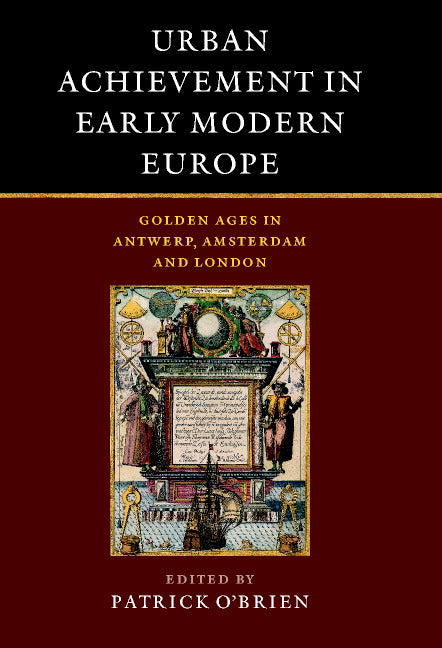Freshly Printed - allow 10 days lead
Couldn't load pickup availability
Urban Achievement in Early Modern Europe
Golden Ages in Antwerp, Amsterdam and London
Comparative urban history examines early modern economic and cultural achievements in Antwerp, Amsterdam, and London.
Patrick O'Brien (Edited by), Derek Keene (Edited by), Marjolein 't Hart (Edited by), Herman van der Wee (Edited by)
9780521594080, Cambridge University Press
Hardback, published 12 April 2001
376 pages, 20 b/w illus. 1 table
23.4 x 15.9 x 2.4 cm, 0.767 kg
"[O'Brien] poses basic questions with refreshing openness, advances ideas but does not proscribe answers. His introduction is noteworthy for setting context and spinning ideas instead of merely summarizing papers...The authors of the fifteen essays are all experts who deliver important chapters." Journal of Modern History
This innovative work in comparative urban history explores why outstanding achievements in material and intellectual culture in early modern Europe tended to cluster in certain maritime cities. Patrick O'Brien and his co-editors have assembled a team of eighteen distinguished historians from Belgium, the Netherlands, Britain and North America, who have collaborated to make detailed comparisons of economic, architectural, artistic, publishing and scientific achievements in three renowned mercantile and imperial cities during their golden ages: Antwerp (c. 1492–1585), Amsterdam (c. 1585–1659) and London (c. 1660–1730). The book examines growth and fluctuations in the fortunes of all three cities in the context of broader trends in the growing urbanization of Europe's populations, cultures, societies and economies. The study is located in the histories of politics, warfare and culture in early modern Europe and offers fascinating insights to scholars and students of economic, social and cultural history.
Part 1. Introduction: 1. Reflexions and mediations on three cities as sources and sites for achievement Patrick O'Brien
Part II. Economic Growth and Demographic Change: 2. Economies of Agglomeration and the Golden Age of Antwerp Michael Limberger
3. Clusters of achievement: the economy of Amsterdam in its Golden Age Clé Lesger
4. The economy of London, 1660–1730 Peter Earle
Part III. Architecture and Urban Space: 5. One of the largest cities in the low countries
One of the best fortified in Europe Piet Lombaerde
6. The glorious city: monumentalism and public space in seventeenth century Amsterdam Marjeolin 't Hart
7. Architecture and urban space in London Judy Loach
Part IV. Fine and Decorative Arts: 8. The fine and decorative arts in Antwerp's Golden Age Hans Vlieghe
9. The rise of Amsterdam as a cultural centre: the market for paintings, 1580–1680 Marten Jan Bok
10. Cultural production and import substitution: the fine and decorative arts in London, 1660–1730 David Ormrod
Part V. Books and Publishing: 11. Antwerp: books, publishing and cultural production before 1585 Werner Waterschoot
12. Metropolis of print: the Amsterdam book trade in the seventeenth century Paul Hoftijzer
13. Printing, publishing and reading in London, 1660–1720 Adrian Johns
Part VI. Scientific and Useful Knowledge: 14. Science for sale: the metropolitan stimulus for scientific achievements in sixteenth century Antwerp Geert Vanpaemel
15. Amsterdam as a centre of Dutch learning in the Dutch Golden Age Karel Davids
16. Philosophers in the counting-houses: commerce, coffee-houses and experiment in early modern London Larry Stewart.
Subject Areas: Educational: Citizenship & social education [YQN], History of science [PDX], Economic history [KCZ], Cultural studies [JFC], Historical geography [HBTP], Social & cultural history [HBTB], Early modern history: c 1450/1500 to c 1700 [HBLH], Early history: c 500 to c 1450/1500 [HBLC], British & Irish history [HBJD1]


